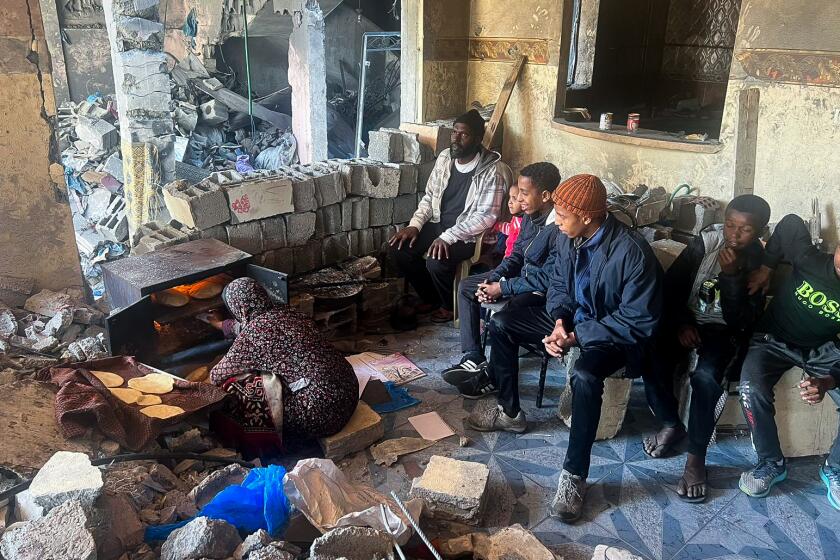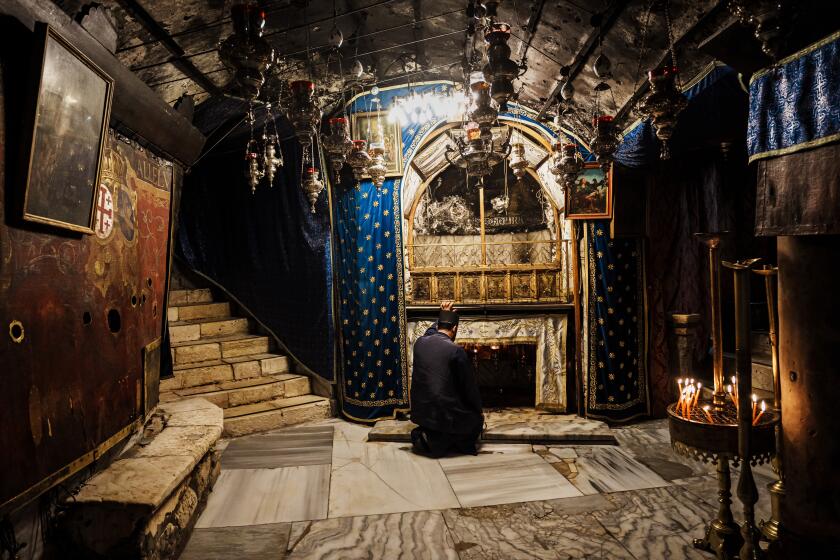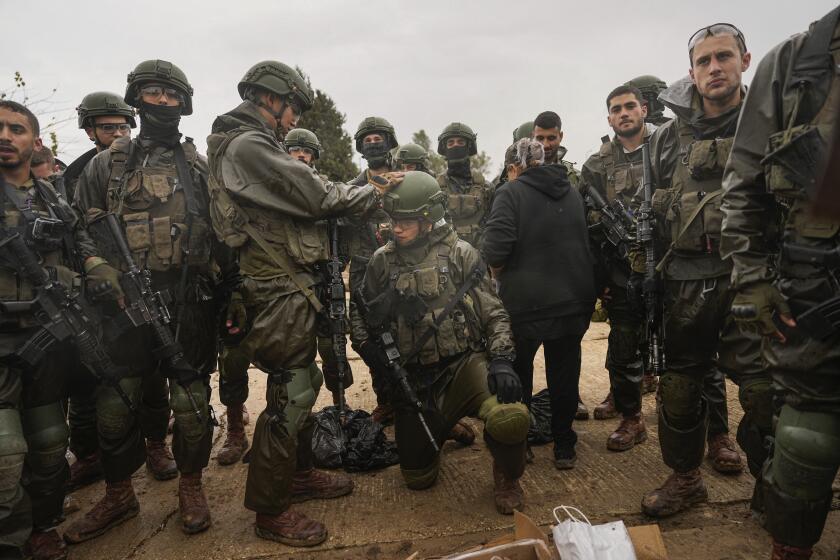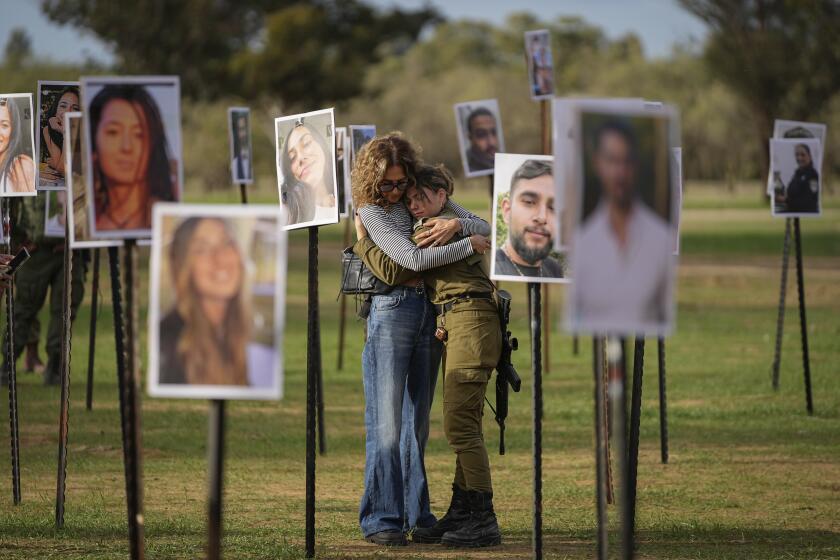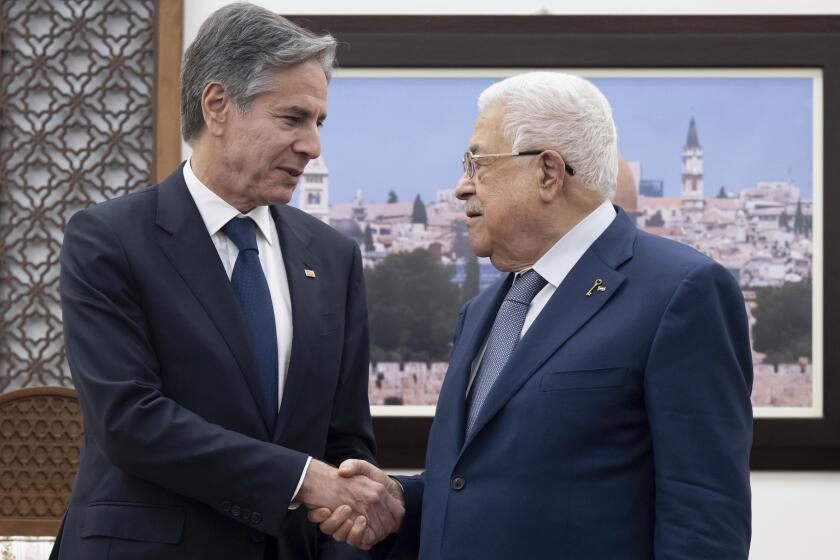Israeli airstrikes kill dozens across central and southern Gaza
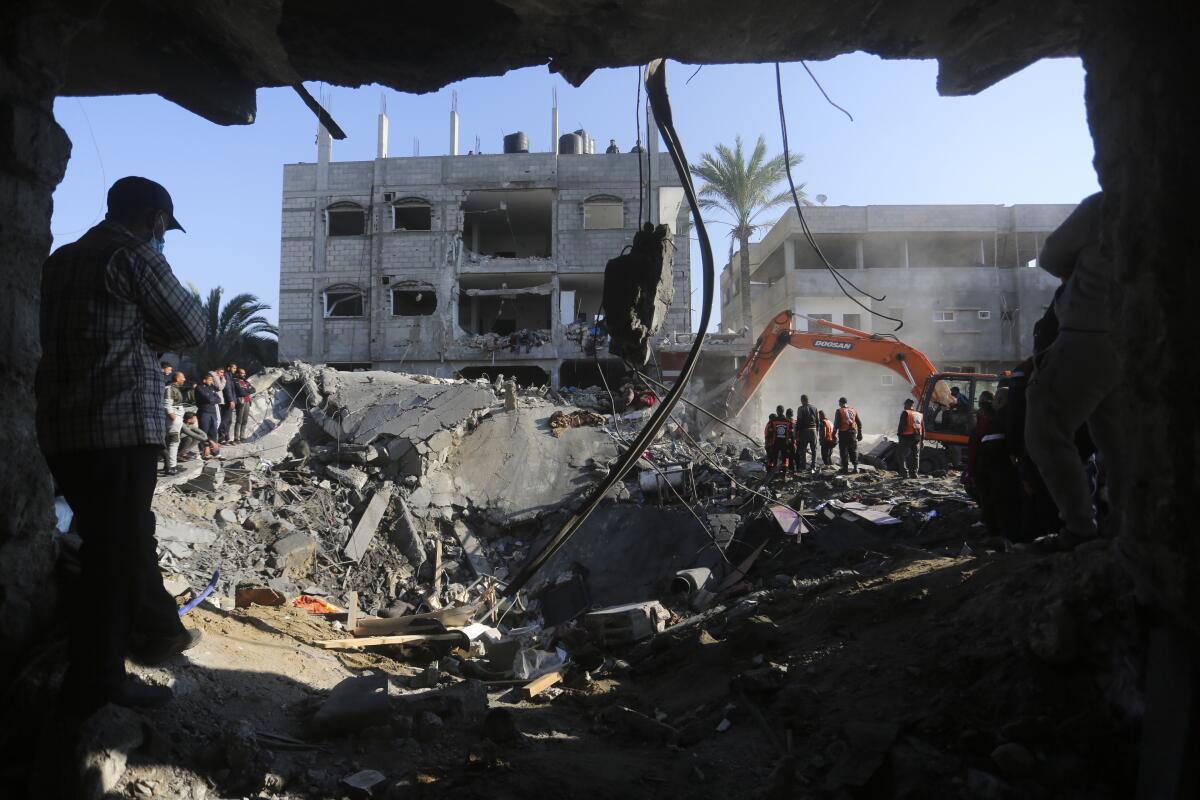
RAFAH, Gaza Strip — The Israeli army has raided and detained staff at two of the last functioning hospitals in Gaza’s north, where the defense minister said Tuesday that troops were working to completely clear out Hamas militants.
Israel bombarded towns across southern Gaza on Tuesday with airstrikes, killing at least 45 Palestinians and pressing ahead with its attacks with renewed backing from the United States, despite rising international alarm. The Israeli defense minister, Yoav Gallant, warned the campaign in Gaza’s south will persist for months.
In a hospital in the town of Rafah, Mahmoud Zoarab bid farewell to his two children — a 2-year-old boy and a girl born two weeks ago — killed in a predawn strike on their home.
Wounded in the strike, he winced as he peeled back the shrouds to look at their faces as his wife and mother stood by his bed.
“Just 2 weeks old. Her name hadn’t even been registered,” said the children’s grandmother, Suzan Zoarab. Addressing Israeli Prime Minister Benjamin Netanyahu, she cried, “Does he think that by killing these children he will achieve something? Have they succeeded now? Has he achieved what he wants?”
Gallant said Israeli forces were entering Hamas’ tunnel network in the northern Gaza Strip as part of a “final clearing” of militants from the region. The densely built urban north, including Gaza City, has seen ferocious fighting between troops and militants, with Palestinian health officials reporting dozens of people killed in the bombardment in recent days.
‘I just don’t know where we’ll go.’ It’s a question Palestinians ask over and over in Gaza as Israel ramps up bombardment after Hamas truce collapsed.
Israeli troops have raided a series of hospitals and shelters in the north, detaining men in a search for militants and expelling others taking refuge there.
Gallant said that in southern Gaza, operations will take “months,” including the military’s assault on Khan Yunis, the territory’s second-largest city. “We will not stop until we reach our goals,” he said.
After meeting with Israeli officials Monday, U.S. Defense Secretary Lloyd J. Austin III urged Israel to protect civilians but reiterated America’s support for Israel in its war against Hamas, saying he was “not here to dictate timelines or terms.”
Strikes across Gaza
Suzan Zoarab said her family was asleep when their home was hit before dawn.
“We found the whole house had collapsed over us.” Twenty-seven people were killed in the strike, along with at least three others in a separate strike in Rafah, according to Associated Press journalists who saw the bodies arrive at two local hospitals early Tuesday.
Rafah, which is in the southern part of Gaza and where Israel has told Palestinians to seek shelter, has been repeatedly bombarded in recent days, often killing large numbers of civilians. Israel said Tuesday that it had killed a prominent Hamas financier in an airstrike on Rafah, without specifying when it occurred.
In Bethlehem, the West Bank town revered as Jesus’ birthplace, Christmas is all but canceled, in solidarity with Palestinians’ suffering in Gaza.
In central Gaza, at least 15 people were killed in strikes overnight, according to hospital records. Among the dead were a mother and her four children, who were killed as they sat around a fire, according to an AP reporter who recorded the aftermath.
Fierce battles also raged in northern Gaza, which has been reduced to a wasteland seven weeks after Israeli tanks and troops stormed in. The military said Tuesday its forces took control of the Jabaliya refugee camp and that it has killed hundreds of Hamas militants there. The claims could not be independently confirmed.
Video online showed a scene of devastation after a strike that hit a local charity in Jabaliya, with several torn bodies near a donkey cart on a street filled with rubble and twisted metal. At least 27 people were killed in that strike and others in the district Tuesday, according to Munir Boursh, a senior Health Ministry official.
The Health Ministry in Hamas-run Gaza said the death toll since the start of the war has risen to more than 19,600. It does not distinguish between civilian and combatant deaths.
Hamas has continued to put up stiff resistance and lob rockets at Israel. The militants said they fired a barrage toward Tel Aviv on Tuesday, and air raid sirens went off in central Israel. There were no immediate reports of casualties or damage.
The war began after Hamas and other militants killed some 1,200 people, mostly civilians, in Israel and abducted 240 others, according to the Israeli government.
Israel’s military says 131 of its soldiers have been killed in the Gaza ground war. It says it has killed thousands of militants, without providing evidence, and blames civilian deaths on Hamas, saying it uses them as human shields.
After Hamas’ attack, the U.S. pledged full support for Israel. Now, as the death toll in Gaza skyrockets, President Biden is trying to rein in Netanyahu.
Hospital raid
Israeli forces raided the Ahli Arab Hospital in Gaza City overnight, according to the church that operates it, destroying a wall at its front entrance and detaining most of its staff.
The facility was the scene of an explosion early in the war that killed dozens of Palestinians, and which an Associated Press investigation later determined was probably caused by a misfired Palestinian rocket.
Don Binder, a pastor at St. George’s Anglican Cathedral, which runs the hospital, said the raid left just two doctors, four nurses and two janitors to tend to more than 100 seriously wounded patients, with no running water or electricity.
“It has been a great mercy for the many wounded in Gaza City that we were able to keep our Ahli Anglican Hospital open for so long,” Binder wrote in a Facebook post late Monday. “That ended today.”
He said an Israeli tank was parked on the rubble at the hospital’s entrance, blocking anyone from entering or leaving.
This moment in the Israel-Hamas saga can be glimpsed in the fate of two fathers, strangers who share misfortunes brought on by larger powers and are now left to find their way
Israeli troops seized northern Gaza’s Al Awda hospital on Sunday after besieging it for 12 days, the international aid group Doctors Without Borders said Tuesday. The troops stripped, bound and interrogated all males over 16, including six of the group’s staff, it said. Most were sent back into the hospital, which the troops still hold, with dozens of patients inside but no essential supplies, it said.
There was no immediate comment from the Israeli military about the hospital raids. Forces have raided other hospitals across Gaza, accusing Hamas of using them for military purposes. Hospital staff have denied the allegations and accused Israel of endangering critically ill and wounded civilians.
Truce proposal
United Nations Security Council members continued intense negotiations on an Arab-sponsored resolution for desperately needed humanitarian aid deliveries to Gaza during some kind of a halt in the fighting. A vote on the resolution, first postponed from Monday, was pushed back again until Wednesday as talks continued to get the U.S. to abstain or vote “yes” on the resolution after it vetoed an earlier call for a cease-fire.
As the Palestinian militant group Hamas frees more hostages amid a temporary truce with Israel, a harrowing glimpse of captivity in war-torn Gaza emerges.
France, the United Kingdom and Germany — some of Israel’s closest allies — joined global calls for a cease-fire over the weekend. In Israel, protesters have called for negotiations with Hamas to facilitate the release of scores of hostages still held by the group.
CIA Director William Burns met in Warsaw with the head of Israel’s Mossad intelligence agency and the prime minister of Qatar on Monday, the first known meeting of the three since the cease-fire and the release of some 100 hostages in a deal they helped broker last month.
But U.S. National Security Council spokesperson John Kirby said the talks were not “at a point where another deal is imminent.”
Jobain reported from Rafah and Magdy and Jeffery from Cairo. Associated Press writers Tia Goldenberg in Tel Aviv and Melanie Lidman in Jerusalem contributed to this report.
The Biden administration views the two-state solution — an independent Palestinian state alongside Israel — as the only way to stop generations of violence.
More to Read
Sign up for Essential California
The most important California stories and recommendations in your inbox every morning.
You may occasionally receive promotional content from the Los Angeles Times.
